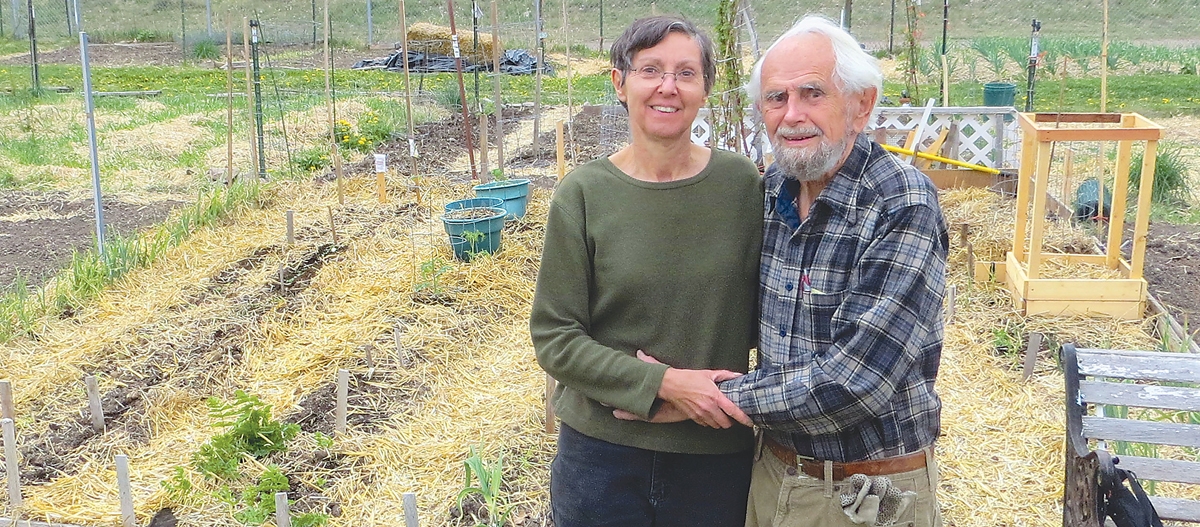Paul and Christiane von Reichert of Missoula, Mont., are some of the most dedicated urban farmers you’ll meet. They’ve convinced landlords to let them dig up apartment courtyards. They’ve grown veggies in community garden plots from Missoula to Kiel, Germany. They’ve traveled to friends’ yards in the Bitterroot to scratch out a little growing space. They’ve transported chickens in bicycle baskets to community gardens to fertilize in the fall (they also raised meat chickens in an apartment that didn’t allow pets). They’ve cured their onions on the porch of their third floor apartment.
It all started for Paul when his father bought a vacant lot for $50, down the alley from their house just east of Corpus Christi, Texas. Paul was 8 at the time. It was 1929. They cultivated the soil and started a garden.
Paul hasn’t stopped gardening since. Ninety years later, he still remembers the exhilaration of that first growing season, where he learned what a tomato should taste like.
Christiane learned from her grandfather at age 4.
Paul and Christiane met in Segovia, Spain. He had purchased a EuroRail pass and was crisscrossing Europe. Christiane asked him if he might want to meet her in Cordoba to see the sights. He said yes, but when he got to Cordoba, she wasn’t there.
“She stood me up on our first date,” he told me, his perennial smile shining through a white beard.
She wound up having a good reason for missing the rendezvou, and everything worked out. They ended up finding each other in Kiel, Germany, three weeks later, where Christiane was living to finish her masters’ degree in geology.
And they never let go.
“We loved the same things, it was that simple,” said Paul. “When I met her, she had three things: herself, a bicycle, and a community garden plot.”
“The garden was a real connection point,” Christiane added.
Paul turned 98 in May. He gardens more slowly now. He had to give up biking last May and uses his two Cadillacs (walkers) to get around most of the time. He showed me a photo of himself with his best garden buddy, a friend’s dog, both lying down next to his community garden plot. That’s how he weeds now, lying down.
It doesn’t seem to upset him. Not much does.
“I’ve led a good life,” he said frequently throughout the course of the interview.
I first heard about Paul because I work for Garden City Harvest, an organization that runs the 10 community gardens in Missoula. He came to Garden City Harvest’s square dance, and I danced with him on what happened to be his 97th birthday.
He gardens a plot at one of our larger gardens and tends the communal raspberry patch. Everybody loves Paul, in part because he always travels with cookies or chocolates to share.
But also because he is always wearing a smile, always wanting to visit, always seeing the good in everything and everybody.
Paul was a firefighter, a navy man in World War II (signed up four days after Pearl Harbor), and a builder-contractor for most of his life.
When Paul and Christiane came to the United States, they moved to Moscow, Idaho. Paul had already started his career as a contractor, but Christiane was interested in trying her hand at flipping houses as a team. They dug into the work together, working long hours, transforming old and broken houses, selling them for a profit, and living very simply along the way.
Paul had rules for this work. It was hard, demanding. They’d go for two weeks straight and then take a break, stealing away to a hot spring for a few days. When they’d finish a house, they’d take a two-week vacation to somewhere far away—traveling to Indonesia, Thailand, Sri Lanka, Upper Sumatra. They’d live on five dollars a day, living like the locals, and often with the locals. They’d board with a family for the night, sleeping on the floor and sharing a meal, and having a richer experience for it.
They flipped 11 houses in 10 years.
It strikes me that Paul loves to work. With his hands. Sanding wood. Building a home, digging out weeds, planting a row, pruning raspberries. Christiane is the same. Paul refers to Christiane as his “little German workaholic.” It’s a compliment in his book.
“Self-providing has always been a big part of Paul’s life,” Christiane told me. “Fishing, gardening, building.”
They are also good at gathering and connecting with people. Community gardens are kept alive by people like Paul and Christiane. Not only do they make friends, distribute sweets, keep up the common raspberries, but they also breathe in new life: bringing students, friends, and visitors to see and help sow their plot.
Now their garden is helped along by at least three other friends as Paul ages and Christiane still works in the University of Montana’s geography department. With Paul and Christiane, you are loved with their garden. Whether it is sweet treats, Paul’s favorite zucchini bread (in zucchini season he makes 8 loaves at a time), or the love they put into the plants they grow, it is a way to show they care. MSN










